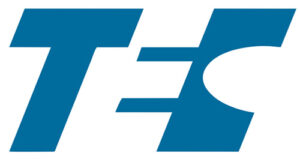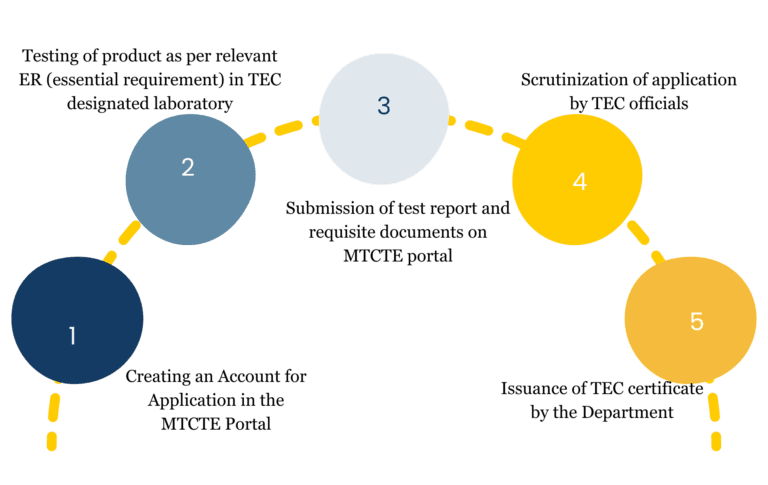
Telecommunication Engineering Centre (TEC), New Delhi, under Department of Telecommunications (DoT), is the Telegraph Authority and Telecommunications regulator in India.
The Telecommunication Engineering Centre (TEC) certification is a mandatory approval process for telecommunications products sold in India. The certification ensures that products comply with India’s technical and safety standards under the Mandatory Testing and Certification of Telecom Equipment (MTCTE) scheme, which was introduced under the Indian Telegraph Rules, 1951. TEC certification is vital for manufacturers aiming to enter the Indian market with telecom-related devices.
Accredited labs in India, designated by TEC (CABS) and recognized by NABL (ILAC member), are authorized to conduct equipment testing.
Based on the test reports provided by these labs, TEC issues the necessary certification for the products.
In September 2017, the Ministry of Communications mandated Mandatory Testing and Certification of Telecommunication Equipment (MTCTE) through the “Indian Telegraph (Amendment) Rules.”
Under MTCTE, TEC releases standards that are called Essential Requirements (ERs) for the respective product lines.
In MTCTE, TEC has notified 55 product lines in four phases so far as of September 2021.
There are a few products for which are yet to be notified, but TEC has released the ERs for the manufacturers to be prepared.
Phase wise product categories covered in MTCTE. Click on the links below to download the files:
Phase II & III List of Products
However, there are a few products that have been withdrawn from the above lists. They are:
Vehicular Radio Broadcasting Receivers – That are shipped along with the vehicle only
Vehicular Tracking devices – That are shipped along with the vehicle only
Mobile user equipment/mobile handset;
Server;
Smart Watch;
Smart Camera and
Point of Sale devices
The Original Equipment Manufacturers (OEM) owning the products intellectual property (in other words owning the design and R&D) of the telegraph equipment would need to apply for the TEC certification under MTCTE. The OEM/ODM can be from any part of the world but the applicant who files the application with TEC would have to an Indian registered organization, which can be an Indian subsidiary of the OEM/ODM or any other third party which has a registered office in India.

The process to achieve TEC certification involves several structured stages, ensuring products meet the necessary requirements. Here’s a step-by-step breakdown:
Preparation of Application Documents
The first step involves preparing all required documentation. This includes:
The application is submitted online via the MTCTE portal. Foreign manufacturers must apply through an Authorized Indian Representative (AIR), who acts as the official contact with TEC.
After the application is submitted, the product must undergo testing in a TEC-accredited laboratory. Product testing follows the guidelines provided by the MTCTE and focuses on the following areas:
Testing is conducted in TEC’s network of accredited labs, ensuring compliance with Indian norms.
Once the testing is complete, the test results and other relevant documents are uploaded to the MTCTE portal. Required documents typically include:
TEC evaluates the submitted reports to ensure full compliance with India’s telecommunication standards.
After the review of documents and test reports, if the product meets the required standards, TEC issues a TEC Certificate. This certificate includes:
This certificate is crucial for the legal distribution of telecom products in India.
Click here to know about the Bureau Of Indian Standard (BIS)
Click here to know about the Telecommunication Engineering Centre(TEC)
Click here to know about the Wireless Planning & Coordination (WPC)
Click here to know everything about ISI Certification Scheme
Click here to know everything about Bureau Of Energy Efficiency (BEE)
Click here to know everything about E-Waste Management
Click here to know everything about Automotive Industry Standards (AIS)
Click here to know everything about Legal Metrology
Click here to know everything about MNRE
Click here to know everything about ATEX/PESO
Click here to know about the Approval Process for the Canadian Market
Click here to know about the SRCC certifications
Click here to know everything about CE Marking
Click here to know everything about E Mark
Click here to know everything about Type Approval for Fiji
Click here to know everything about Type Approval for Hong Kong
Click here to know everything about India Approvals
Click here to know everything about PSE Mark
Click here to know everything about MIC Certificate
Click here to know everything about Type Approval for Malaysia
Click here to know everything about Type Approval for Russia
Click here to know everything about Type Approval for Saudi Arabia
Click here to know everything about Type Approval for South Africa
Click here to know everything about Type Approval for Singapore
Click here to know everything about Type Approval for South America
Click here to know everything about Type Approval for South Korea
Click here to know everything about NCC Certificate
Click here to know everything about BSMI Mark
Click here to know everything about Type Approval for USA
C-PRAV has vast experience both on the technical qualification and experience in handling TEC projects. Our professional team will assist you with end to end coverage of services – samples handling to certificate issue.
We handle the entire documentation related to the Registration process.
Support and co-ordinate for the Registration of the Manufacturer with TEC
C-PRAV ensures product testing at TEC-designated labs, liaising for technical issues, timely completion of tests.
We have strong technical knowledge, liaise with TEC, handle documentation, agreements, and online submission.
We Support as an Authorized Indian (Local) Representative for the Foreign Manufacturing Unit.
Co-ordinate and liaise with TEC for any clarifications addressing queries raised by TEC
Support any additional miscellaneous/incidental works including technical support throughout the approval process